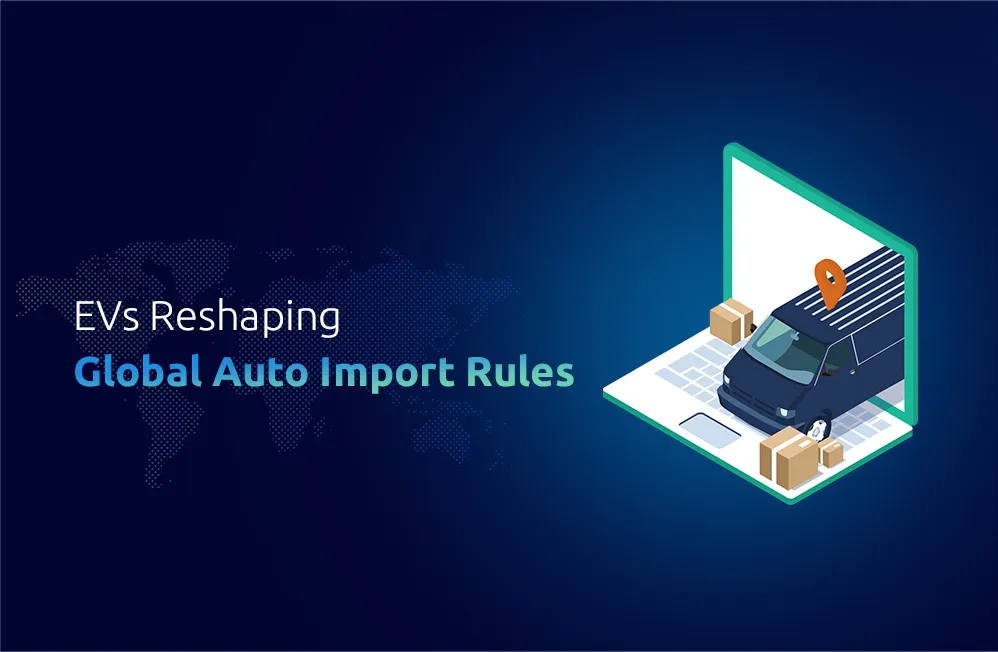Introduction
The automotive industry is substantially changing from inner combustion to electric vehicles (EVs). Governments worldwide, along with environmentally conscious consumers, have strongly driven up the popularity of electric vehicles. Consumer preferences evolve alongside an overturn of global auto import rules and trade regulations. Governments rushed the implementation of EV-promoting policies, but these new policies created complex trade challenges that presented manufacturing opportunities and consumer trade difficulties.
The Surge of Electric Vehicles / EVs
The worldwide EV market experienced rapid expansion throughout the previous few years. The worldwide electric vehicle sales rate experienced a 35% annual increase during 2023 & delivered more than 14 million vehicles, which amounted to about 18% of total car sales. Market research indicates that EV sales will grow substantially fast until they reach about 30% of all global car sales in 2030. The global EV stock exceeded 50 million units in 2024 because major markets such as China, Europe, and the U.S. led this growth.
The technological progress in carbon emission reduction has introduced disruptive changes to the automobile and parts marketplace. The rising volume of electric vehicle imports requires nations to change their import rules, leading to modifications in customs duties, excise requirements, and tariff rates.
Impact on Global Auto Import Rules
Electric vehicles (EVs) have transformed the global transportation industry, requiring governments to redefine automobile import legislation. National governments currently implement protective measures that back their domestic manufacturers and support home-based production.
Through its 25% tariff on imported vehicles in 2023, the Biden administration seeks to build domestic EV manufacturing capacity in the United States. The higher prices caused by European and Asian auto industry changes make imported electric vehicles more and less attractive in the market, which benefits Tesla and other U.S. EV producers.
EU countries imposed tariffs on Chinese Electric Vehicles to defend their vehicle industry while Chinese government aid provided affordable pricing for these cars. The government created these import duties to defend home manufacturers while working to minimize foreign product dependency.
As the world’s leading EV market, China now enables foreign automobile manufacturers to establish joint ventures under relaxed guidelines that boost worldwide business cooperation. The government preserves vehicle import tariffs despite allowing hybrid model development as a workaround against particular trade restrictions.
Shifting Trade Dynamics
Global auto import patterns are changing due to increasing EV market growth. The number of nations aiming to build their domestic EV production capacity to decrease their dependence on imported cars has increased. It is actively adopted by emerging markets’ governments that offer financial benefits to foreign companies willing to establish local production facilities.
India, Brazil, and other countries are using tax incentives and import duties for EVs manufactured locally. Because of high import taxes, global automobile producers must start domestic manufacturing or deal with more expensive imported vehicles.
The Future of Global EV Trade and Auto Imports
The worldwide automotive industry shows quick changes, so trade policies must adapt to electric vehicle manufacturing transitions. The global automotive sector requires automakers to respond to emerging national manufacturing initiatives. International collaboration has become vital for companies that intend to preserve their market position in a competitive environment. Local manufacturing receives tremendous government support through incentives that provide tax reductions, process grants, and financial assistance for establishing manufacturing operations in the country.
Western countries, such as India and Brazil, have established beneficial production agreements to attract global EV manufacturers into their territories. State policies support EV development by exempting import duties for specific components, tax breaks for homegrown production and flexible conditions for international manufacturers. The local market competition grows as import dependence decreases due to new reforms created by these measures.
The export boom of EVs from Japan and South Korea to emerging markets occurs through special measures that lower import taxes for EVs and their components. The expanding market shift toward local production makes global automakers reorganize their manufacturing base and supply chain networks to fit these emerging business patterns.
Impact on Global Trade Relations
Electric vehicles have produced important changes in worldwide commercial alliances. Traditional car export countries need to develop new marketing plans because they cannot maintain their previous export business. Public agreements between international powers transform to safeguard domestic manufacturing capabilities while maintaining global business competitiveness.
EVs have opened significant market potential while introducing new obstacles. The adoption of trade obstacles such as tariffs and quotas by countries has increased due to their intention to protect home manufacturers and accelerate environmentally friendly technology integration. Local EV market participants are undergoing direct impacts from the new EV-centered trade regulations that governments have established.
The current circumstances hold potential opportunities for organizations to expand their businesses. The transformation of the trade environment enables automotive manufacturers who establish local production to build economic success while providing discounted electric vehicles for their customers.
Conclusion
The electric future of the world has led to drastic shifts in auto import rules and trade regulations, which have been dominant for many years. The increasing number of electric vehicles drives nations to review their policies, thus opening manufacturing possibilities at home while increasing international market competition. Through its commitment, One Union Solutions supports clients who need to understand evolving global automotive trade regulations while markets transform.
Did You Know
China primarily led electric vehicle sales worldwide during 2024 with its 50% market share. The national drive for EV adoption supported by domestic manufacturer policies transformed China into the world’s dominant electric vehicle marketplace.
FAQs
- Why are electric vehicles becoming the new choice in the automotive industry?
Ans: The transition to electric vehicles happens because people actively seek environment-friendly sustainable transportation, & the government provides incentives while society worries about ecological problems. Modern technical developments in EVs and charging systems have lowered prices while increasing availability.
- What effect do present tariffs have on importing electric vehicles into the market?
Ans: The price of imported EVs faces substantial variations because electric vehicles typically have different tariff rates depending on the importing country. A 25% United States tariff imposed on imported cars transforms the competitiveness of foreign-manufactured EVs in the U.S. market by increasing their prices. The EU established tariffs against Chinese-made electric vehicles to defend their home manufacturers.
- What results does local EV production receive when government incentives are implemented?
Ans: Local electric vehicle production receives essential support from government programs offering subsidies, tax advantages, and grants. The outcome of these measures leads to lower costs during EV manufacturing in local facilities, which produces more competitive product prices for both international and domestic markets.
- Toy companies are dominating the electric vehicle manufacturing industry. Which countries demonstrate the greatest lead?
Ans: Electric vehicle production globally occurs mainly in China, the U.S. and Europe. The rapid growth of China’s domestic EV market features major EV manufacturers BYD and NIO among its worldwide leaders.
- What effects do new import regulations bring to consumers’ buying preferences?
Ans: Changes to import regulations directly affect both the availability of electric cars and their market prices. The manufacturing costs linked to new trade regulations and tariffs have increased consumer prices of imported electric vehicles. Local vehicle manufacturing enables economical pricing and an expansion of available electric car choices in the market.












